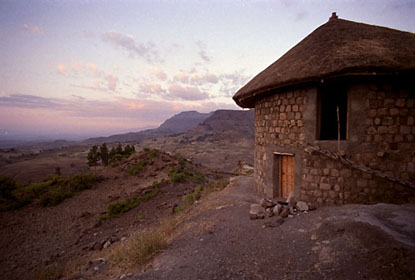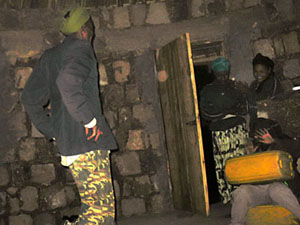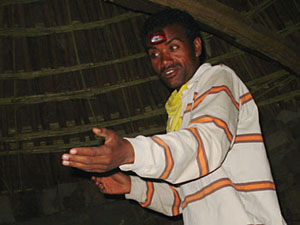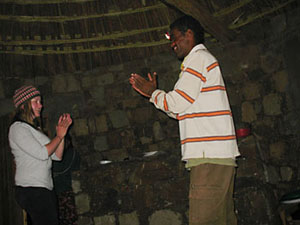Day 4: Christmas in Yadukulay
I collapsed on the stone benches lining the inside of the dining tukul. Mulugeta had diplomatically decided we could rest early at the camp, and take the short hike to a nearby church later that day. After our long descent, the final stretch back up to Yadukulay was so steep that the minute I sat down I knew I would opt out.
 Sunset at Yadukulay, the newest TESFA camp |
Mulugeta's favorite cooks were at Aterow, but I felt Yadukulay's cooks had the edge. Yadukulay was TESFA's newest camp; the young cooks hadn't seen as many visitors yet and were very excited to meet us. I was perturbed to note that our snack involved more injera. I'm all for immersing into local culture but we were paying 300 birr per day for an organization founded by a Brit; tourists growing weary of injera should have been assumed.
By grabbing a spoon and skipping the injera, I concluded that Yadukulay's cooks had whipped up the most luscious vegetarian wats I'd had since arrival. I most appreciated the delicately spiced pumpkin wat, and wondered if I could get it at home.
Jochen and I chatted about one of our mutual favorite shows—Scrubs—for an embarrassingly long time. With alternating showers on Yadukulay's precipitous slope and more time to talk, we wiled away the afternoon in this manner until it was appropriately late enough to crack open some beers. Jochen also shared some delicious ginger cookies from Cologne, a local specialty only eaten on Christmas Eve. Yadukulay was perhaps 500 meters lower in altitude, allowing us to stay out a bit longer without freezing.
The Ethiopian calendar follows its own rules, so Christmas is not officially until January 7th. However, everyone knew that the ferengis considered this to be a holiday, and sweetly wished us a happy Christmas.
 The staff starts off the festivities |
 Mulugeta exhorts us to join in |
 Jodie and Mulay warm up with some clapping |
Each night Mulugeta had asked us our favorite and least-favorite aspect of that day's hike. Nina—whose goofy humor quickly united the group but also made her a person I wouldn't normally befriend—ruthlessly teased him for being sappy. Normally no one had anything bad to say, but this night I admitted the descent had been too arduous for me. To my surprise, Mulugeta said that my terror had also been his worst part—he'd felt horrible and didn't know how to help.
He mentioned that many trekkers had complained of the difficulty and that the community members—who incidentally negotiated the paths daily—had discussed clearing the rocks. Much to my discomfort, the others protested loudly, saying it was "proper" trekking and that it hadn't been taxing for them at all.
In the awkward silence, we quickly decided it was shoulder-dancing time! We pushed Jochen up first, as he'd missed out the previous night, and laughed at his game effort. Jodie, Nina and I struggled to perfect our technique, while Jess displayed again what some loose joints can do. Amazing that Mulay was not double-jointed but could pop-lock just as sharply as she did.
With two nights in a row of watching the staff dance and create riotous music, Mulay decided it was our turn to offer something. Unable to determine a more classy bit of shared culture, Nina strong-armed us into performing the hokey-pokey. Jochen had never heard of it and I had never seen the variation familiar to the other girls. Jess, who'd spent part of her childhood in Canada explained the North American version did not involve running into the circle and screaming "HEEEEEY...THE HOKEY-POKEY!!"...as well it shouldn't. It was hilarious and so incredibly absurd. I hoped the community did not really believe we were imparting some sort of cultural tradition.
Perhaps more appropriately, we sang "Silent Night" simultaneously in English and German to close out the night.